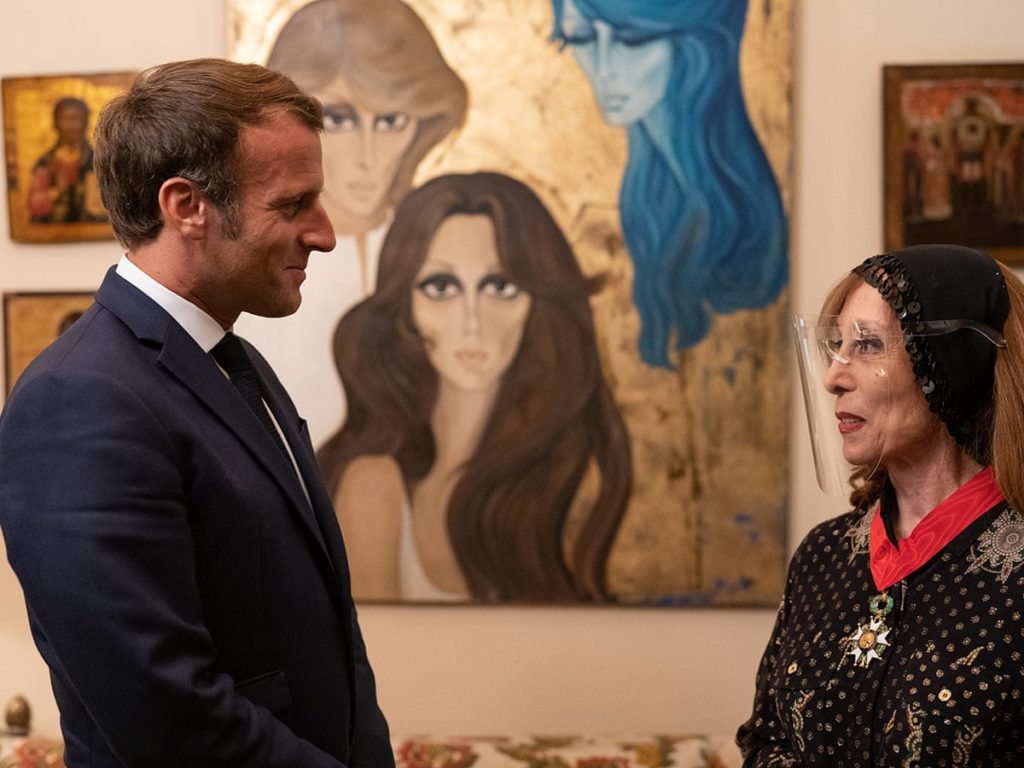"I love you Lebanon my country
your north your south your plains I love
you ask what happened
what has overcome me
I love you Lebanon my country."
Thus sang the legendary Lebanese diva Fairouz in 'Bahebak Ya Lebnan' ( I love you Lebanon) during the 15-year-old civil war, becoming the biggest icon of hope and unity of a country which is sharply divided between Sunni, Shiite, Druze, Maronite and Orthodox Christians. However, Fairouz has attained that stature that her songs transcend all these barriers even her being a Maronite Christian does not matter. There is a saying in Lebanon that the Lebanese still start their day listening to Fairouz’s songs who is also known as ‘Our Ambassador to the Stars'.
This is the reason why French President Emmanuel Macron, when landed in Beirut on September 1, did not meet any political leader, instead drove away straight to the house of Fairouz in the north of Beirut to confer on her the Legion of Honour, France's highest order of military and civil merit established in 1802 by Napoleon Bonaparte.
Behind Macron's symbolic visit, there was a very significant political message implying that Lebanon, which is going through the worst crisis in its history after the civil war, needs a unifying factor.
The Lebanese people were already reeling under the impact of the worst financial crisis in its history, and a resurgent coronavirus outbreak. The Beirut port blast further compounded these woes. Apart from killing 190 people and reducing one-third of the city to rubble, whatever was stored at the port was also destroyed.
The government of Prime Minister Hassan Diab facing charges of corruption and incompetency was blown away by angry street protests. Even the naming of Mustapha Adib as the prime minister has not restored the confidence of the people in the system of governance. As Marcon left Fairouz's house, he encountered an angry crowd raising slogans against Adib. This looks a sure recipe for Lebanon descending into deeper chaos.
In these times of national crisis, Lebanon needs a unifying symbol or an icon of hope and who better could it be than Fairouz. September 1 has great political significance in the history of Lebanon as 100 years ago on the same day, General Henri Gouraud through a decree declared the creation of the State of Greater Lebanon, which later became the Lebanese Republic. As the French president planted a cedar tree declaring the country's "rebirth," a Lebanese man echoed the national sentiment saying: "It is beginning to feel a lot like 1920”.
The Beirut blast has created deeper wounds than the craters it left in its wake. The Lebanese people will have to rebuild the country anew which already suffers from a deep religious divide. In such chaotic times, Fairouz is the only one of the rare figures who is loved across the political spectrum. The reason for such reverence for Fairouz is that being a very shy and private person never expressed her political views or inclinations. Her disdain for political leaders can be gauged from the fact she has never performed at a private concert for even head of states.
The 85-year-old singer, who rarely gives interviews, has not given any public performance for more than a decade. It was Marcon's visit that gave the public a glimpse of Faioruz and her house. Born in 1934, Nouhad Haddad, a Maronite Christian, was given the name Fairouz (turquoise or emerald in Arabic) by the Beirut radio station director. In this present turmoil, Lebanon needs someone like Fairouz who has always kept a discreet distance from politicians and Georges Bechara, one of her admirers, says she sings for Lebanon and never wanted to be with one party against another or support a politician against another.
In 'Bahebak Ya Lebnan', Fairouz says:
"I said our land is being reborn
the Lebanon of dignity a people that perseveres
how could I help loving you
even in your madness I love you."
Certainly, Lebanon is going through a rebirth of sorts and it needs all the perseverance, dignity, love and even madness to regain its old glory.
Asif Ullah Khan


